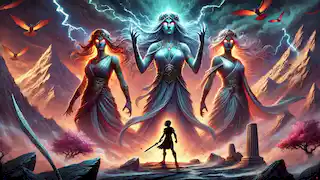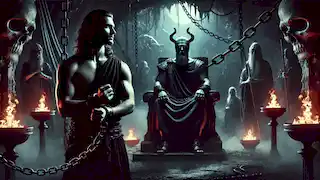The Legend of the Erinyes
Reading Time: 9 min

About Story: The Legend of the Erinyes is a Legend from greece set in the Ancient. This Dramatic tale explores themes of Justice and is suitable for Adults. It offers Moral insights. A tale of vengeance, justice, and the transformative power of mercy.
The ancient lands of Greece hold countless stories, whispered by the wind through the olive groves, echoed by the mountains, and sung by the waves of the Aegean Sea. Among these tales is the legend of the Erinyes, known in Roman mythology as the Furies. These fearsome deities of vengeance were born from blood, wrath, and an unwavering sense of justice. Their names—Alecto, Tisiphone, and Megaera—struck terror into the hearts of mortals and gods alike. They punished those who broke oaths, committed murder, and defiled the sacred laws of family and society. The Erinyes did not relent, and once they set their eyes on a target, there was no escape.
But behind their terrifying façade was a story, a tragedy of their creation, their relentless pursuit of justice, and a young mortal who dared to stand before them. This is the legend of how the Erinyes came to be, and how their path intertwined with that of a young warrior named Evander, whose courage and defiance would change their fate forever. In the early days of the world, when the gods still walked among mortals and the Earth was ruled by Titans, an act of unspeakable violence birthed the Erinyes. Cronus, the Titan who had overthrown his father Uranus, sought to consolidate his power. In his lust for dominance, he took up a sickle of adamantine and struck down Uranus, his own father, spilling his blood across the land. From the blood of Uranus, the Erinyes were born. Dark, vengeful forces took shape in the form of three sisters, each representing a different aspect of wrath. Alecto, the "Unceasing," whose fury knew no bounds; Tisiphone, the "Avenger of Murder," whose anger was ignited by bloodshed; and Megaera, the "Jealous One," whose heart swelled with rage at betrayal. The Erinyes did not seek to punish Cronus for his crime, for in those days, the world was ruled by chaos, and the Erinyes were but agents of justice without allegiance. They emerged from the earth, fully formed, their eyes burning with the flames of divine wrath, and they roamed the lands of Greece, hunting those who had transgressed against the natural order. Centuries passed, and the Erinyes continued their reign of vengeance. Mortals spoke their names in fear, knowing that their sins would be punished without mercy. The gods themselves respected the Erinyes, for even Zeus, the king of the Olympians, had no desire to cross them. In the city of Argos, a young warrior named Evander grew up hearing these stories. His mother had told him that the Erinyes were the last defense against chaos and disorder, and that they existed to protect the laws of the gods and the sanctity of family. But Evander was different. He was headstrong, filled with the fire of youth and the desire to forge his own path. One day, a great tragedy befell Argos. The king's brother, Lycaon, murdered his own son in a fit of rage, violating not only the sacred bond between father and child but also the laws of the gods. The Erinyes, hearing of the crime, descended upon Argos. Their eyes blazed with righteous fury as they sought out Lycaon, who had fled into the mountains to escape their wrath. Evander, unaware of the Erinyes' presence, ventured into the mountains to hunt. His path crossed with Lycaon's, who begged for mercy, telling the young warrior that the Erinyes were pursuing him. Evander, believing that even the worst of men deserved a second chance, took pity on Lycaon and offered him shelter. But it was not long before the Erinyes found them. They appeared in the night, their forms cloaked in shadows, their voices hissing like the winds of a storm. "Evander," Alecto said, her voice filled with venom, "you stand in the way of justice." "I stand for what is right," Evander replied, raising his sword. "Even the guilty deserve a chance at redemption." The Erinyes did not flinch. "There is no redemption for those who have spilled the blood of their kin," Tisiphone snarled. "Step aside, or face the same punishment as the murderer you defend." Evander knew he could not stand against the power of the Erinyes, but he refused to let them take Lycaon without a fight. He raised his sword and charged at the three sisters, their eyes burning with the fire of the gods. The clash between Evander and the Erinyes was short-lived. Despite his courage, he was no match for their divine power. With a single strike, Alecto disarmed him, and Tisiphone bound him in chains of shadow. Megaera looked down at the defeated warrior, her expression one of cold disdain. "You are brave," she said, "but bravery does not absolve you of your crime. You have obstructed justice and shown mercy to one who does not deserve it. For this, you will face trial before the gods." Evander, weakened and bound, was taken by the Erinyes to the underworld, where Hades himself would judge him. In the depths of the underworld, surrounded by the souls of the dead, Evander stood before the god of the underworld, his heart pounding in his chest. "You stand accused of defying the will of the Erinyes," Hades said, his voice echoing through the cavernous hall. "What do you have to say in your defense?" Evander took a deep breath. "I acted out of compassion," he said, his voice steady. "Lycaon committed a terrible crime, but I believe that even those who have sinned deserve a chance to repent. The Erinyes are agents of justice, but justice without mercy is tyranny." Hades regarded him with a cold, calculating gaze. "And do you think yourself wiser than the gods, mortal? Do you think you know better than the Furies, who have existed since the dawn of time?" "I do not claim to be wiser," Evander replied. "But I believe that there must be balance. Vengeance without mercy leads only to more bloodshed. I ask for a chance to prove that even the worst of men can change." Hades was silent for a long moment, his eyes narrowing as he considered Evander's words. Finally, he spoke. "Very well. I will grant you a trial, but know this: if you fail, your soul will be condemned to the darkest depths of Tartarus, and you will suffer for eternity. The Erinyes will be your judges." Evander's trial took place in the heart of the underworld, where the spirits of the dead gathered to witness his fate. The Erinyes stood before him, their eyes glowing with divine fire, their expressions unreadable. "You have defied us, mortal," Alecto said, her voice as cold as the winds of the underworld. "And now you will be judged for your actions." Tisiphone stepped forward, her eyes narrowing. "You claim to have acted out of mercy, but mercy is not your place. Justice is the domain of the gods, and you have no right to interfere." Megaera, the most silent of the three, finally spoke. "But there is truth in your words, Evander. Vengeance without mercy can lead to a cycle of destruction. Perhaps there is room for mercy in justice, but it is not for you to decide." Evander stood tall, his heart racing as he faced the three sisters. "I do not seek to undermine the laws of the gods," he said. "But I believe that mercy and justice must go hand in hand. Without one, the other becomes meaningless." The Erinyes were silent for a long time, their expressions unreadable. Finally, Alecto spoke. "You have shown great courage, Evander. Few mortals would dare to stand before us and speak such words. But courage alone does not absolve you of your crime." Tisiphone nodded. "We will deliberate, and your fate will be decided." For what felt like an eternity, Evander waited in the darkness of the underworld, the weight of his fate pressing down on him. Finally, the Erinyes returned, their eyes glowing with divine fire. "We have reached a decision," Alecto said. "You have defied us, but your words have made us reconsider. There is truth in what you say—justice must be tempered with mercy. For this reason, we will not condemn you to Tartarus. But you must still face punishment for your defiance." Evander braced himself, his heart pounding in his chest. "What is my punishment?" "You will serve the Erinyes," Megaera said, her voice soft but firm. "You will become an agent of justice, tasked with carrying out the will of the gods. You will travel the world, seeking out those who have committed great crimes, and you will bring them to justice. But you must always remember—mercy and justice must be balanced. Fail in this task, and you will be condemned to the darkest depths of the underworld." Evander bowed his head, accepting his fate. He had sought to balance justice with mercy, and now he would walk the path of the Erinyes, seeking to uphold that balance in a world filled with chaos and bloodshed. the Erinyes And so, Evander became a servant of the Erinyes, traveling the lands of Greece in search of those who had defied the laws of the gods. With each step he took, he carried the weight of his duty, knowing that the fate of many rested in his hands. He would bring justice to the wicked, but he would also show mercy to those who deserved it, always remembering the lesson he had learned in the underworld. The legend of the Erinyes continued, but their path had changed. No longer were they seen as merciless agents of vengeance. Through Evander, they became symbols of a new kind of justice—one that balanced wrath with compassion, punishment with forgiveness. In time, the name of Evander was spoken with reverence throughout the lands of Greece. He became a hero, not because of his strength or his skill in battle, but because of his unwavering dedication to justice. The Erinyes, once feared by all, became guardians of the natural order, ensuring that the laws of the gods were upheld, but also that mercy was not forgotten. And so, the legend of the Erinyes lived on, a story of vengeance, justice, and the power of mercy. It was a reminder to all that the gods' wrath could be tempered, and that even in the darkest moments, there was always hope for redemption.The Birth of Vengeance

The Mortal Defiance

The Trial of Evander

The Judgment of the Erinyes

The Path of

















